Rice Prices In Iran Double In One Year Amid General Inflation
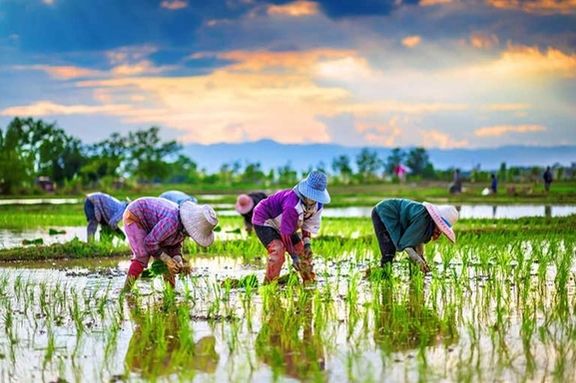
The price of Iranian rice, the main food staple in the country, has increased over 95 percent in one year, a government reporting agency has said.

The price of Iranian rice, the main food staple in the country, has increased over 95 percent in one year, a government reporting agency has said.
According to the latest report released by Statistical Center of Iran (SCI)on Monday, the price for one kilogram of Iranian rice in the month of Bahman (ended on February 20) increased by about 20 percent compared with the previous month, and 95 percent compared with a year ago.
The report said the price reached 760,000 rials (about $3), showing a 95.3-percent rise compared to the same period last year.
The price reported by SCI is way lower than the actual price in the market, which is nearly 1,000,000 rials (about $4), which means the real increase in the price of rice is closer to 200 percent.
With only a few weeks left until the new Iranian year on March 20, prices of essential food items are still rising at alarming levels, local media report.
Food prices have been rising much faster than the general inflation rate -- hovering around 40 percent -- with government figures showing above 60-percent inflation at retail level in 2021, compared with 2020.
Sugar and different types of rice are usually items with highest price increases followed by different kinds of meat, chicken and eggs as well as cooking oil.
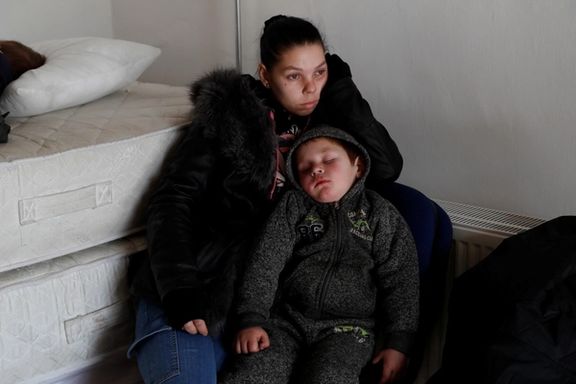
Javan newspaper, linked to Iran’s Revolutionary Guard, has criticized the support voiced for Ukrain by many ordinary Iranians and activists on social media.
The daily said in its Monday issue that those who portrayed the Iranian government as a proponent of the Russian invasion are "Western puppets" and “extremist reformists".
The article added that they are more concerned about the fall of the US-backed government in Ukraine than the lives of the Ukrainian people.
It also described the crisis in Ukraine the result of NATO's eastward expansion that stem from “US and European sedition”.
The IRGC-linked paper called President Volodymyr Zelenskyy “a comedian and actor” who plugged his country to the abyss of a devastating war.
Many Iranians on social media have praised Zelensky, who has refused to leave Kiev in order to stiffen resistance, with some comparing him to former Afghan President Ashraf Ghani who fled the country as the US-trained army collapsed last summer when the Taliban advanced.
The debate about Russia’s invasion of Ukraine continues in Iran, with divisions reflecting wider disagreements among various factions over foreign policy. While reformists have been more critical of Russia, and social media has aired decidedly anti-Russian sentiments, hardliner media has sided with Russia.
Many ordinary Iranians invariably support Ukraine and condemn the government pro-Russia policies.
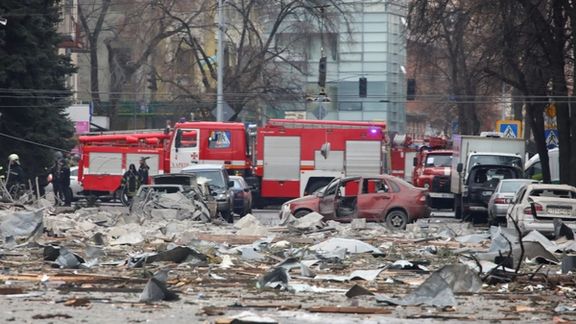
Iran's Supreme Leader on Tuesday said Iran is against war in Ukraine but held the US responsible for disrupting its stability and "creating a colored coup".
Reiterating that the US and Western countries cannot be trusted, Supreme Leader Ali Khamenei said Ukraine has fallen victim to US policies and the crises created by Washington without mentioning Russia's invasion in his speech.
He added that Iran opposes the killing of people and the destruction of the infrastructures belonging to other nations and added that Iran wants the war in Ukraine to end. "But resolving any crisis is only possible if its root causes are identified. The Ukrainian crisis is rooted in American policies, Western policies".
“The US disrupted the stability of the country by interfering in its affairs and organizing rallies and creating a colored coup,” he said, possible referring to the revolution in 2014 that toppled Ukraine’s former president Viktor Yanukovych. In a televised speech Khamenei claimed that people in Ukraine "did not enter the scene [to defend their country] because they did not recognize [the legitimacy of] their government."
Khamenei’s distortion of the facts on the ground were obvious. The world has been in awe as Ukrainians of all walks of life have joined volunteer forces to fight against Russia’s invading forces.
After widespread protests following the disputed re-election in 2009 of ultra-conservative Mahmoud Ahmadinejad, Khamenei blamed Western powers, particularly Britain, for instigating "sedition" in Iran. The protests became known as the ‘Green Movement’.
"What they did in 2009 was a new initiative which was Americans' initiative…It was a color revolution, actually a color coup, an unsuccessful color coup," he said in a speech on January 9, 2016. "The coup was an attempt to incite a full-scale civil war in Iran [to pave the way] for foreign domination."
Calling the governments of President Volodymyr Zelenskyy and former Afghan president Ashraf Ghani "puppet regimes", he said they had both confessed that the US had abandoned them when crises arose at home.
Zelenskyy’s Twitter account has jumped to nearly four million followers in recent days and his determination to resist the invasion has changed long-held European policies of low defense spending and transfer of weapons.
In the speech that marked Eid al-Mab’ath – the anniversary of the Prophet Mohammad's announcement of his prophethood, Khamenei drew a parallel between the early Islamic history and current times and said the US is a perfect example and manifestation of modern "ignorance", as were the opponents of the Prophet in his time.
In the past few days, Iranian officials including President Ebrahim Raisi and Foreign Minister Hossein Amir-Abdollahian, also attributed the crisis in Ukraine to NATO and American “provocations".
Raisi also held a phone call with the Russian President Vladimir Putin on the first day of the Russian invasion. "The President of Iran expressed understanding with respect to Russia’s security concerns caused by the destabilizing actions of the United States and NATO," a Kremlin press release said Thursday evening.
Many Iranians and media outlets have a different view. "Contrary to the government's stance, the hearts of many Iranians are with the people of Ukraine and they condemn this aggression,” reformist commentator Sadegh Zibakalam tweeted February 26.
Some Iranian journalists and media have criticized Raisi's call. "What is the justification for Raisi's call to Putin on the first night of Russia's invasion of Ukraine and subtly supporting Russia?" Behrouz Azizi, an Iranian journalist who identifies himself a "moderate conservative", tweeted Thursday.
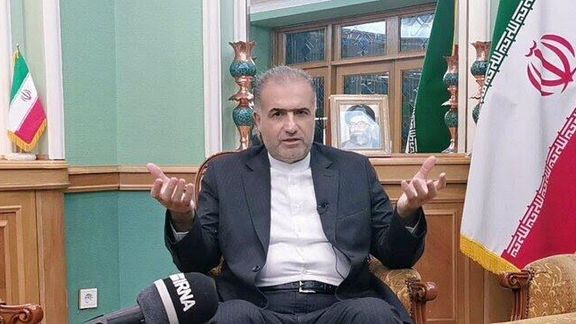
Iran's envoy to Russia has said NATO's expansion is not in the interest of Tehran and Moscow, and there is a global synergy against Western “unilateralism.”
The comments came as Iran has supported Russia’s invasion of Ukraine by blaming the United States and NATO for the ensuing crisis.
During a webinar about bilateral relations and regional developments, Kazem Jalali urged closer cooperation with Moscow under President Vladimir Putin, saying, “We are working with Russia on regional issues, and have a successful experience in Syria’s case”, Jamaran News in Tehran reported on Monday.
"Obviously, neither we nor the Russians see NATO expanding to our borders in our interest," said Tehran’s ambassador in Moscow.
Turkey, a NATO member borders Iran in the northwest but has followed a neutral policy between the Washington and Tehran.
Jalali added that Russia has stood up to American unilateralism, noting that this is the same approach that the Islamic Republic has taken since the 1979 revolution.
Jalali noted that Iran did not have good relations with the Tsarist Russia, the Soviet Union, and in the post-Soviet period, adding, “The fourth era is the Putin era, which I think should be paid more attention to”.
Judging by the history of Iran-Russia relations, “some people ask why we should have relations with the Russians when we have such a history with them. We should know that during the Soviet era 25 million people were killed in the war with Germany” but that didn’t stop them to cooperate on the Nord Stream --the system of offshore natural gas pipelines in Europe that runs under the Baltic Sea from Russia to Germany.
He added that “we should look at the realities of today”, underlining that Iran’s new government prioritizes relations and strengthening cooperation with neighboring countries, and “Russia is a large economy.”
Jalali went on to say that “our foreign policy should serve Iran’s national interests”, urging to keep a balance between the West and the East.
In fact, in the past 30 years under Supreme Leader Ali Khamenei Iran’s foreign policy has increasingly tilted toward Russia and China. In the 1980s, when the founder of the Islamic Republic Ayatollah Ruhollah Khomeini was Supreme Leader, the country followed his dictum of “Neither West Nor the East.”
During the same event, former member of the parliament Elaheh Koulai described ties between Iran and Russia as one of the most important issues in Eurasia.
“There are bitter events in the history of Iran-Russia relations that have caused pessimism and Russophobia in Iranian society” she added.
She called for a balancing approach with Russia, Europe and the United States, saying, “we must try to use Russia to our advantage”.
Referring to the Russian invasion of Ukraine, Koulai said, “Iran must condemn Russia's military action against Ukraine and demand that the two sides sit down at the negotiating table”.
As debate about Russia’s invasion of Ukraine continues in Iran, divisions reflect the political dispositions of various factions over Tehran’s foreign policy.
Hardliners close to the core of the regime fiercely defend a pro-Russia policy, while their rivals within the regime argue for more balanced relations between the West and the East, meaning Moscow and Beijing.
Many ordinary Iranians and opponents of the Islamic Republic invariably support Ukraine and condemn the government pro-Russia policies on social media.
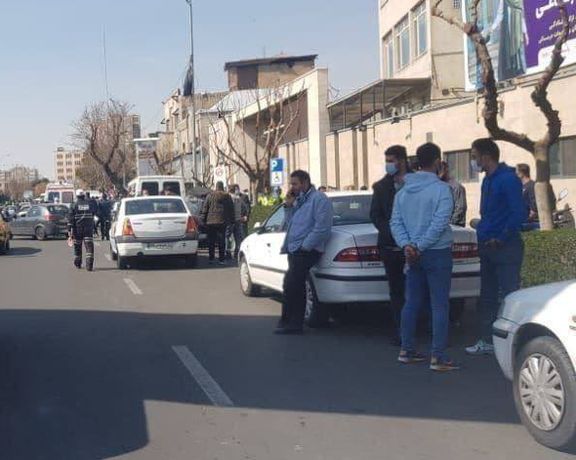
Dozens of active personnel and retirees of the armed forces have held protests in several Iranian cities to protest their poor living and working conditions.
According to videos posted on social media, the Monday rallies were held in front of the governor's offices in cities across the country such as Mashhad, Shahrekord, and Kermanshah while protesters in Tehran gathered in front of the parliament.
The demonstrations took place following a call circulated on the internet by the personnel and retirees of the armed forces to protest their low salaries.
Some former and current personnel received text messages from security agencies warning them against participating in the planned protests.
People from different walks of life, including teachers, nurses, and firefighters, have been holding regular protest rallies or strikes to demand higher salaries but such protests by the personnel of the armed forces are unprecedented.
In some other rare moves, staff members of the hardliner judiciary department and prison guards took to the streets in several cities across the country to protest their low salaries.
Earlier in January, the spokesman for Iran's police said salaries of police officers have increased several times in the previous nine monts, describing their living conditions as a major concern. However, the government cannot afford to pay substantially higher salaries in par with the rising food prices on top of high inflation in the previous few years.

Iranian media and pundits say the newly found Chalous gas field in the Caspian Sea could not in time supply gas to Europe, if Russian shipments are sanctioned.
United States and European sanctions on Russia are far milder than against Iran, with oil and gas flowing to the West. While Russian gas exports to Europe via Ukraine continued normally Monday, financial sanctions on Russia and moving the Champions League soccer final have prompted some Iranian commentators to point out that Iran cannot move into the breach if Europe were to bar Russian gas.
Shargh newspaper wrote Monday that it would be wrong to overplay Iran's potential for replacing Russia in European markets. The reformist newspaper informed readers that Iran could not supply LNG (liquefied natural gas) given a lack of infrastructure – although Russian gas is supplied mainly by pipeline.
Iran needs foreign investment and technology to develop gas infrastructure, which has been difficult given years of international and United States sanctions. Iran and Russia hold 37 and 32 trillion cubic metres (tcm) of the world's proven gas reserves, while they respectively produce 250 and 638 billion cubic meters (bcm) of gas annually while respectively consuming 233 and 411 bcm domestically.
One of Tehran’s main aims is talks with world powers over restoring the 2015 nuclear deal - which US President Donald Trump withdrew from in 2018 – is to see lifted draconian US sanctions. Total, the French energy major withdrew from a contract in the South Pars gasfield in 2018due to the US ‘maximum pressure’ sanctions, a contract that included LNG development, which could be important for Tehran’s worldwide exports.
"The truth is we can't do anything in this regard unless we solve our problems with the rest of the world, which requires the restoration of the nuclear deal (JCPOA) and deepening of relations with developed countries," Morteza Behrouzi, energy expert, also told Hamshahri newspaper in September 28.
The Chalous Basin reportedly holds 30 percent of developable natural gas reserves of all Caspian Sea littoral countries and could, following $19 billion in investment and the lifting of US sanctions, be well placed to supply Europe.
Even before the recent Ukraine crisis, some argued Russia has over the years tried to prevent Iran from exporting gas to Europe.
"Russia will not allow Iran to enter the European gas markets that easily and will use every tool at their disposal to prevent Europe from overcoming its dependence on Russian gas," Alireza Soltani, political economist told Entekhab website February 16. "They will prevent [Iran from exporting gas to Europe] but even if it’s to happen, they want it to happen under Russian control."
Iranian officials have long been warning of inadequate natural gas production that cannot keep pace with domestic consumption. Energy consumption is relatively high because of state subsidies to consumers − costing $45 billion a year- that put gasoline, electricity and other fuels at low levels compared to other countries. Iran's oil minister Javad Owji said November that to avoid becoming a net importer, Iran needed $160 billion of investments in its oil and gas industries in the coming years.